5 KINDS OF HOSTING EXPLAINED (WITH EXAMPLES/PICTURES)
5 KINDS OF HOSTING EXPLAINED (WITH EXAMPLES/PICTURES)
Hosting is a necessary service that keeps the internet running. All websites are “hosted” by one service or another. And boy, there are a lot of hosting services out there. Truthfully, some of them are just terrible. Most though, offer enough uptime and support to keep your website running without interruption.
Even if you have a good grasp on hosting, there are many elements to consider. Did you know there are several types of hosting used on the internet today?
A lot of people think that all hosting is the same. Different websites need different kinds of hosting to make the website function and to be found by millions of people. Let’s look at what hosting is, does, and the different kinds of hosting that are available to meet your needs. For more info feel free to check out our top hosts for Australia.
WHAT IS WEB HOSTING?
Anytime you look at a webpage on the Internet, what you are viewing is an interpretation of code that has been written to make the website look and function a certain way. The web browser you are using to see the website, such a Google Chrome, is what converts that code into visuals, pictures, buttons, and more. This code needs a place to live.
Think of code like the files on your computer; the files live on the hard drive of your computer. The files which hold the code need to be “hosted” or held somewhere on the internet to be found and interpreted by web browsers. Hosting companies sell you space to house your files.
Think about it like this….
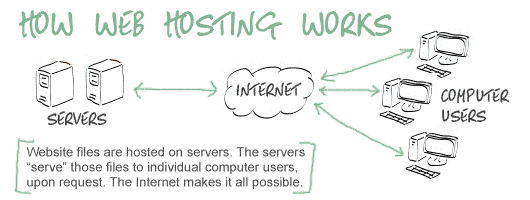
WHAT’S THE DIFFERENCE BETWEEN HOSTING AND A SERVER?
The server is what holds the files that are being “hosted” for you. The hosting companies sell you server space to keep your website functioning. But that’s not all: many hosting companies will provide you with a range of additional services to ensure your site stays up and running. Many of these services include customer support, malware scanning, and more.
What are the Various Types of Hosting Available?
Some hosting companies will offer only one or two types of hosting, while others will offer all kinds of hosting. There are four basic types of hosting services provided to website owners: cloud hosting, VPS hosting, shared hosting and dedicated hosting.
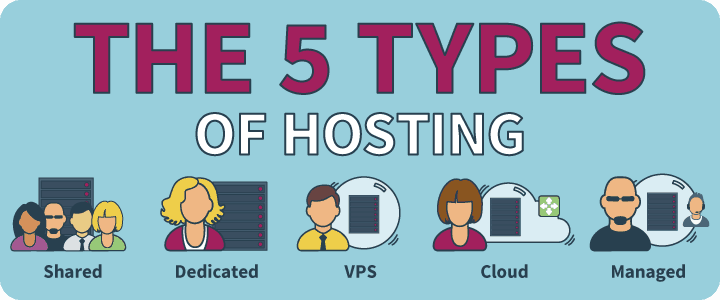
The types of hosting are determined by several factors including the technology that makes them run, the level of management offered, and the add-on services that are provided to customers. These might include services such as SSL certification, free bandwidth and more.
SHARED HOSTING EXPLAINED
Shared hosting is considered one of the cheapest ways to host a website because the cost of the space is spread amongst several users. Unfortunately, this also makes it not very reliable because multiple sites are drawing on the servers at once, which can cause uptimes to lag, and create interruption for some website owners.
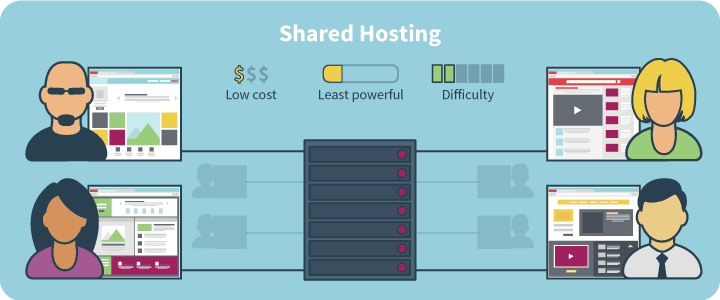
Still though, if budget is a concern, shared hosting might be a good way for you to get started. Some shared hosting sites will house up to 1,000 users on a single server. That means that your website is fighting to get to the top of the pile all the time.
If you find that your website is continuously performing slowly, you could ask your hosting service to move your site to another server that isn’t so overloaded. They might do it for you. Shared hosting is not for everyone, but it is excellent for some applications, especially test websites that won’t be living there long, house development sites, or other sites that don’t expect to get a lot of traffic. If you’re looking for a quality shared host we recommend Siteground.
Having your website “go down” a few times is not going to be the end of the world unless you expect thousands of visitors to your site a month. The truth is that most downtime happens overnight in certain parts of the world, so you might not even notice depending on where you live.
VPS HOSTING EXPLAINED
VPS hosting is quite popular on the internet. VPS stands for virtual private server, and it means you’ll have more access to the power of your host’s server because they are limited to 10-20 users. What’s great about VPS hosting is that even if another website eats up all their RAM, your site won’t go down. This means that your website will experience less interruption, which is always good for business.
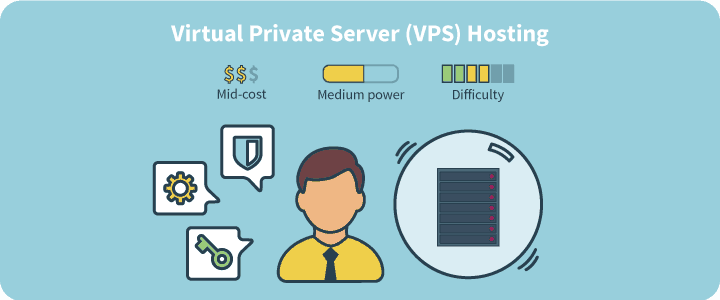
VPS hosting is not as expensive as you might think, given that it is practically a dedicated server for a few people. It will cost about $20 a month to get started, which in the big scheme of things, is peanuts.
If keeping your website up and running all the time is vital to you, but you understand how your usage works, then a VPS is ideal; though, any business should be able to afford $20 a month for a VPS. This type of hosting can grow with your company too, and it only takes a few minutes to take a bigger piece of the server if you need it.
DEDICATED HOSTING EXPLAINED
If you expect your website is going to bring in a lot of traffic, then you’ll want to pay for a dedicated hosting service. We’re talking 100,000 visitors or more per month here. Dedicated hosting services are just that: dedicated to you and your website. This means that you won’t share your online resources with anyone else. You’ll get a server all to yourself, so you will need to know a thing or two about configuring your setup. Dedicated hosts are also highly recommended for small businesses.
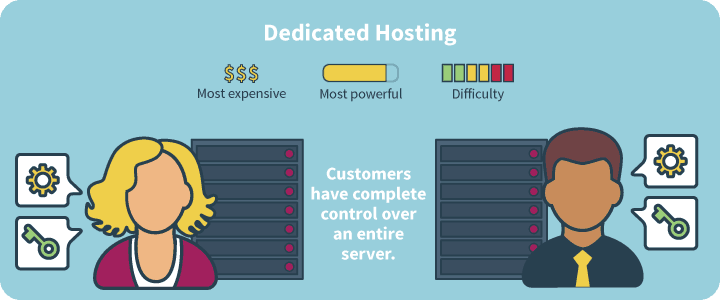
Your hosting company will help you through this, but it helps if you have an idea of what you need. Your website will be much faster than other sites running on shared or VPS hosting services, but you’ll need that to contend with the high volumes of traffic you are getting or expected to receive.
The average website owner does not need dedicated hosting services. There are only two instances when a company would need to invest in a dedicated hosting service: if they have any highly sensitive information they need to house on a database, or if they have highly specialized hardware needs and want to maintain control over that. Depending on the hosting company you choose, and the additional services you need, you can expect to pay anywhere from $200 to $2000 a month for a dedicated server.
CLOUD HOSTING EXPLAINED
Cloud Hosting is the new word for VPS hosting, but for clarity sake, we’ll keep them separate. Many hosting companies have converted to cloud hosting completely, while others maintain VPS or a combination of both. The major difference is that cloud hosting is virtually limitless.
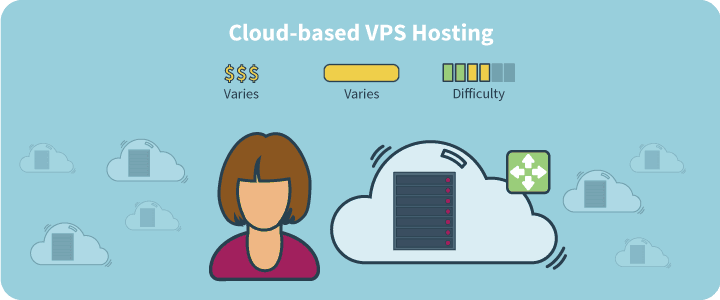
Where VPS has limits on the amount of bandwidth and data transfer it can provide, cloud hosting can draw on the same resources over and over again. It’s kind of like trying to run your laptop on battery – it will eventually run out, and your computer will shut off. That’s VPS. If you plug it into the wall, you can use your laptop indefinitely on a revolving power source. This type of hosting is suitable for most businesses.
What’s great about cloud hosting is that it was born on the internet and hosts understand how to keep websites safe from overwhelming information requests, spam, and even pings that can crash your servers. Most new website owners won’t care or even realize there is a difference between VPS and cloud-based hosting. But it’s good to know just the same.
The most important thing to remember is that if scaling is in your future, cloud hosting is probably a better option for you. It’s just the new way of doing business. Large companies such as Google and Amazon host their servers on cloud-based systems, so you know it’s a good thing.
OUR FINAL THOUGHTS ON THE DIFFERENT KINDS OF HOSTING
If you are thinking about starting a blog, you’ll need a website. And if you need a site, you are going to need hosting. It is the one step you cannot skip. Some website building companies offer in-house hosting services, so you don’t need to worry about setting up your own, but if you are building your website, you’ll need to spend some time doing your homework about which hosting service is right for you.
It’s not complicated to set up hosting services, and many are user-friendly and can be set up in a matter of minutes. If you are working with ready-made website templates, you can often buy hosting services from those companies as well. Keep in mind that many website/hosting companies run websites on shared servers so your uptime can be compromised in those instances. But when getting started, they aren’t a bad idea for beginners.
Overall, the hosting you choose is going to depend on the kind of company you are running, how many visitors you anticipate will visit your website each month, and the type of information that will be stored on your site. Answering those questions will lead you to the right hosting service for you.
Thanks for stopping by
Hosting is a necessary service that keeps the internet running. All websites are “hosted” by one service or another. And boy, there are a lot of hosting services out there. Truthfully, some of them are just terrible. Most though, offer enough uptime and support to keep your website running without interruption.
Even if you have a good grasp on hosting, there are many elements to consider. Did you know there are several types of hosting used on the internet today?
A lot of people think that all hosting is the same. Different websites need different kinds of hosting to make the website function and to be found by millions of people. Let’s look at what hosting is, does, and the different kinds of hosting that are available to meet your needs. For more info feel free to check out our top hosts for Australia.
WHAT IS WEB HOSTING?
Anytime you look at a webpage on the Internet, what you are viewing is an interpretation of code that has been written to make the website look and function a certain way. The web browser you are using to see the website, such a Google Chrome, is what converts that code into visuals, pictures, buttons, and more. This code needs a place to live.
Think of code like the files on your computer; the files live on the hard drive of your computer. The files which hold the code need to be “hosted” or held somewhere on the internet to be found and interpreted by web browsers. Hosting companies sell you space to house your files.
Think about it like this….

WHAT’S THE DIFFERENCE BETWEEN HOSTING AND A SERVER?
The server is what holds the files that are being “hosted” for you. The hosting companies sell you server space to keep your website functioning. But that’s not all: many hosting companies will provide you with a range of additional services to ensure your site stays up and running. Many of these services include customer support, malware scanning, and more.
What are the Various Types of Hosting Available?
Some hosting companies will offer only one or two types of hosting, while others will offer all kinds of hosting. There are four basic types of hosting services provided to website owners: cloud hosting, VPS hosting, shared hosting and dedicated hosting.

The types of hosting are determined by several factors including the technology that makes them run, the level of management offered, and the add-on services that are provided to customers. These might include services such as SSL certification, free bandwidth and more.
SHARED HOSTING EXPLAINED
Shared hosting is considered one of the cheapest ways to host a website because the cost of the space is spread amongst several users. Unfortunately, this also makes it not very reliable because multiple sites are drawing on the servers at once, which can cause uptimes to lag, and create interruption for some website owners.

Still though, if budget is a concern, shared hosting might be a good way for you to get started. Some shared hosting sites will house up to 1,000 users on a single server. That means that your website is fighting to get to the top of the pile all the time.
If you find that your website is continuously performing slowly, you could ask your hosting service to move your site to another server that isn’t so overloaded. They might do it for you. Shared hosting is not for everyone, but it is excellent for some applications, especially test websites that won’t be living there long, house development sites, or other sites that don’t expect to get a lot of traffic. If you’re looking for a quality shared host we recommend Siteground.
Having your website “go down” a few times is not going to be the end of the world unless you expect thousands of visitors to your site a month. The truth is that most downtime happens overnight in certain parts of the world, so you might not even notice depending on where you live.
VPS HOSTING EXPLAINED
VPS hosting is quite popular on the internet. VPS stands for virtual private server, and it means you’ll have more access to the power of your host’s server because they are limited to 10-20 users. What’s great about VPS hosting is that even if another website eats up all their RAM, your site won’t go down. This means that your website will experience less interruption, which is always good for business.

VPS hosting is not as expensive as you might think, given that it is practically a dedicated server for a few people. It will cost about $20 a month to get started, which in the big scheme of things, is peanuts.
If keeping your website up and running all the time is vital to you, but you understand how your usage works, then a VPS is ideal; though, any business should be able to afford $20 a month for a VPS. This type of hosting can grow with your company too, and it only takes a few minutes to take a bigger piece of the server if you need it.
DEDICATED HOSTING EXPLAINED
If you expect your website is going to bring in a lot of traffic, then you’ll want to pay for a dedicated hosting service. We’re talking 100,000 visitors or more per month here. Dedicated hosting services are just that: dedicated to you and your website. This means that you won’t share your online resources with anyone else. You’ll get a server all to yourself, so you will need to know a thing or two about configuring your setup. Dedicated hosts are also highly recommended for small businesses.

Your hosting company will help you through this, but it helps if you have an idea of what you need. Your website will be much faster than other sites running on shared or VPS hosting services, but you’ll need that to contend with the high volumes of traffic you are getting or expected to receive.
The average website owner does not need dedicated hosting services. There are only two instances when a company would need to invest in a dedicated hosting service: if they have any highly sensitive information they need to house on a database, or if they have highly specialized hardware needs and want to maintain control over that. Depending on the hosting company you choose, and the additional services you need, you can expect to pay anywhere from $200 to $2000 a month for a dedicated server.
CLOUD HOSTING EXPLAINED
Cloud Hosting is the new word for VPS hosting, but for clarity sake, we’ll keep them separate. Many hosting companies have converted to cloud hosting completely, while others maintain VPS or a combination of both. The major difference is that cloud hosting is virtually limitless.

Where VPS has limits on the amount of bandwidth and data transfer it can provide, cloud hosting can draw on the same resources over and over again. It’s kind of like trying to run your laptop on battery – it will eventually run out, and your computer will shut off. That’s VPS. If you plug it into the wall, you can use your laptop indefinitely on a revolving power source. This type of hosting is suitable for most businesses.
What’s great about cloud hosting is that it was born on the internet and hosts understand how to keep websites safe from overwhelming information requests, spam, and even pings that can crash your servers. Most new website owners won’t care or even realize there is a difference between VPS and cloud-based hosting. But it’s good to know just the same.
The most important thing to remember is that if scaling is in your future, cloud hosting is probably a better option for you. It’s just the new way of doing business. Large companies such as Google and Amazon host their servers on cloud-based systems, so you know it’s a good thing.
OUR FINAL THOUGHTS ON THE DIFFERENT KINDS OF HOSTING
If you are thinking about starting a blog, you’ll need a website. And if you need a site, you are going to need hosting. It is the one step you cannot skip. Some website building companies offer in-house hosting services, so you don’t need to worry about setting up your own, but if you are building your website, you’ll need to spend some time doing your homework about which hosting service is right for you.
It’s not complicated to set up hosting services, and many are user-friendly and can be set up in a matter of minutes. If you are working with ready-made website templates, you can often buy hosting services from those companies as well. Keep in mind that many website/hosting companies run websites on shared servers so your uptime can be compromised in those instances. But when getting started, they aren’t a bad idea for beginners.
Overall, the hosting you choose is going to depend on the kind of company you are running, how many visitors you anticipate will visit your website each month, and the type of information that will be stored on your site. Answering those questions will lead you to the right hosting service for you.
Thanks for stopping by

